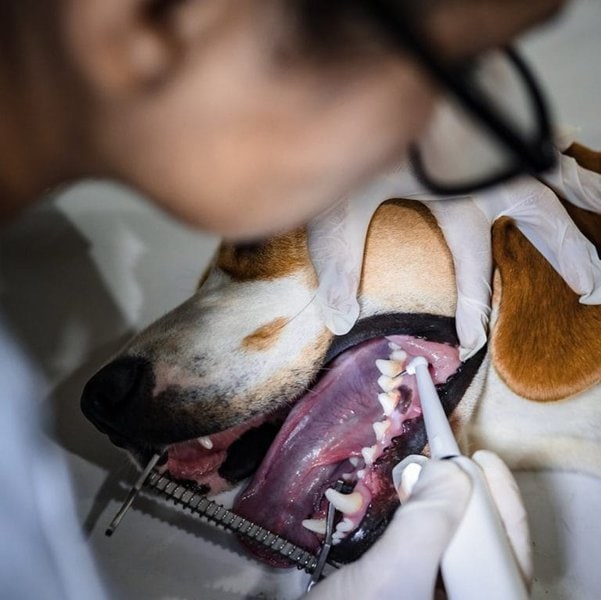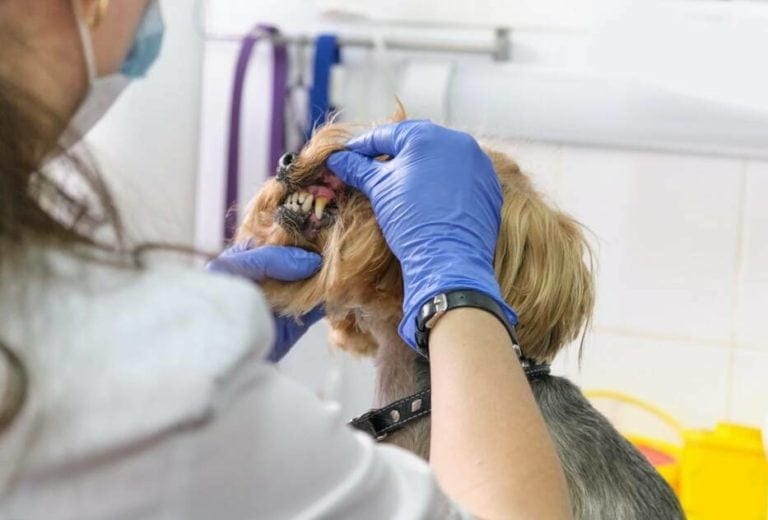Just as with humans, dental care is extremely important for dogs and their overall wellbeing, and as such, it is crucial that you take matters regarding your dog’s teeth seriously.
Now, how much does it cost to get a dog’s teeth cleaned? The average cost to get a dog’s teeth professionally cleaned typically ranges from between $450 to $1,000. And this is a value that can be significantly higher depending on the dog’s age, size and additional dental services that may need to be carried out.
Dental hygiene goes beyond keeping your dog’s teeth white, and you should subject your pooch to a comprehensive teeth cleaning procedure every now and then to prevent plaque build-up. This article covers the procedures involved in a typical canine teeth cleaning exercise, as well as the dangers of failing to get your dog’s teeth cleaned. However, before we go into all that, let’s see how much it’ll cost to get a dog’s teeth cleaned, and why this procedure can be quite expensive at times.
What Is The Cost Of Having A Dog’s Teeth Cleaned?
The average cost of having a dog’s teeth cleaned at a reputable veterinary clinic typically falls between $450 to $1,000, and there is every tendency for this price to climb even further.
The reason dog teeth cleaning is so expensive is not far-fetched, and it all boils down to the anesthesia that is typically required for this procedure. Other contributing factors include a host of additional services such as medical examinations, patient monitoring, X-rays medication, hospitalization and home dental care packages, if necessary.
Similarly, there are other factors that play a significant impact in how much it’ll cost to get your dog’s teeth cleaned, and that’s what we’ll be taking a look at next.
Factors That Affect The Cost Of Cleaning A Dog’s Teeth
Some of the other factors that contribute to the cost of cleaning a dog’s teeth include:
Your Vet’s Billing Method
If your vet clinic bills based strictly on the nature of the dental cleaning procedure required, then you may just need to pay a couple hundred dollars for the entire operation.
However, if you’re charged based on the amount of time elapsed during the dental procedure, you can end up paying thousands of dollars if your dog goes into surgery for tooth extraction.
The Dog’s Age
Usually, it will cost you more to carry out a dental cleaning operation on an older dog, compared to what you’ll pay for the same procedure on a young pooch.
Older dogs usually need a lot of preparatory tests to determine their capacity to handle going under anesthesia, and this can significantly jack up the medical bills.
Size Of The Dog
Size is another factor that can impact on the cost of a dental cleaning procedure, and this has to do with the amount of anesthesia needed for the procedure.
Generally, the larger the size of a pooch, the more anesthesia is required to knock it out, and consequently, the higher the vet bill. The reverse is the case for smaller dogs, and you will usually need to spend less on anesthesia.
Additional Dental Operations
There may also be the need to carry out extra dental operations along with the teeth cleaning procedure, and this will impact heavily on the total cost of the procedure.
Extraction of a broken or diseased tooth is one of such extra dental operations, and there’s a host of other dental issues that may require you to pay more in vet bills.
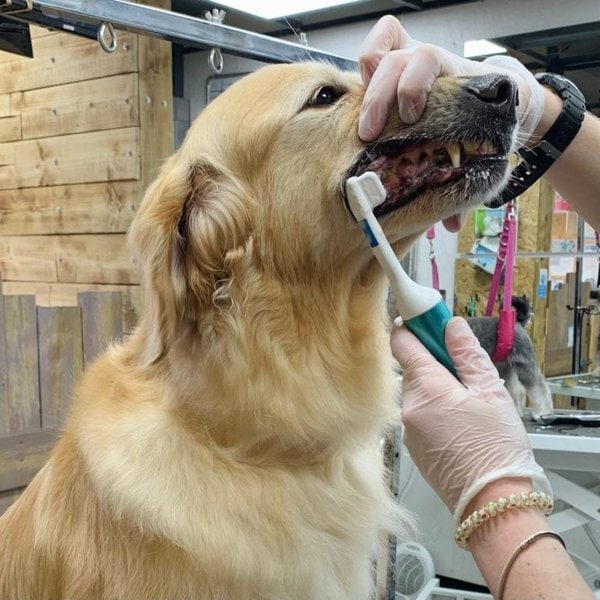
How Long Does It Take A Vet To Clean A Dog’s Teeth?
The dog cleaning process is a relatively short procedure, and without any complications, a vet will usually get it done within 45 minutes to one hour.
However, if complications arise during the operation, the dental cleaning process becomes significantly longer, and it may take a vet up to four hours or more to successfully clean the dog’s teeth.
Typically, the steps required to carry out a dental cleaning procedure on a dog are detailed as follows:
Comprehensive Medical Examination
Before your vet begins the dental cleaning procedure at all, a comprehensive physical examination should be carried out on the dog to ensure it is healthy enough to undergo such a procedure.
Carrying out this medical examination helps the vet foresee any possible complications that may arise during the cleaning process. And this, in turn, helps the vet make preparations to overcome such obstacles.
Placing The Dog Under Anesthesia
Once the pooch is cleared to be healthy, vets typically begin the canine dental cleaning process by intubating and placing the dog under heavy anesthesia.
Without anesthesia, the vet will only be able to perform a limited oral examination, and the ideal dental tools can’t be used to clean the dog’s teeth.
Additionally, without the use of anesthesia, a vet can only clean the external part of a dog’s teeth, thereby leaving the critical, hard-to-reach regions located under the gum line unattended to.
During anesthesia, most vets will typically make use of an Intravenous Catheter (IV) to administer the appropriate fluids and keep the dog’s blood pressure at an optimal level.
Cleaning The Dog’s Teeth
The cleaning process involves the use of the appropriate dental tools to clear dirt that has accumulated in the dog’s mouth.
This process typically involves the use of ultrasonic and hand scalars to remove plaque and tartar from the canine’s teeth. And as a follow-up to plaque removal, the pooch’s mouth is thoroughly rinsed.
In addition to plaque removal, the dog’s teeth are polished to prevent subsequent plaque build-up; This is done to even out small etches that may form on the dog’s teeth during the cleaning process, and which may serve as a potential location for subsequent plaque build-up.
Also, while cleaning a dog’s teeth, the vet will usually attempt to check for the presence or potential occurrence of periodontal diseases with the aid of dental probes.
What Happens After Cleaning A Dog’s Teeth?
Recovery from a canine dental cleaning procedure is typically fast, and most dogs will be back to normal between 10 to 15 minutes after the entire operation. The dog is also usually left at the vet clinic for a post-cleaning observation period of 24 hours.
Additionally, there may be a need for the vet to prescribe soft dog food to feed your pooch, and this is because the pooch’s teeth may be a bit extra sensitive after surgical procedures.
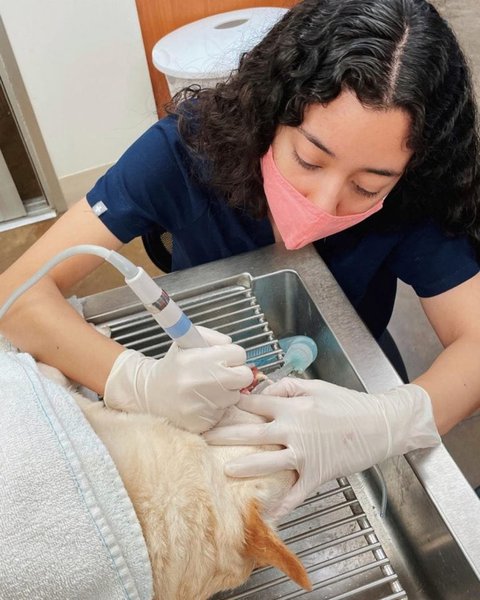
Do Dogs Really Need Teeth Cleaning?
Regular teeth cleaning can help prevent your pooch from suffering from most dental and oral infections that dogs are typically predisposed to.
And occasional teeth cleaning is even more important for small dog breeds, as they are at a higher risk of suffering from dental infections, compared to the bigger dogs.
Frequent and timely teeth cleaning is quite effective at preventing the occurrence of periodontal disease in your dog, that if left untreated, can lead to organ damage and critical health issues.
While you can help your pooch maintain great oral hygiene by regularly brushing its teeth at home, most canine dental infections typically happen below the gum line, and as a matter of fact, this region can’t be reached with a regular dog brush.
Consequently, comprehensive teeth cleaning is needed to access and clean the inner parts of your dog’s mouth, and to also identify and prevent the occurrence of dental issues.
How Often Should You Clean Your Dog’s Teeth?
It is recommended that you get your dog’s teeth professionally cleaned at least, once a year.
For a dog with a history of dental problems, the cleaning frequency should be shortened and it is best that you take such a pooch for comprehensive teeth cleaning every six months.
In-between these comprehensive teeth cleaning exercises, you can employ the use of dental sprays and water additives to help maintain great oral hygiene. It is also recommended that you brush your dog’s teeth, at least, 2 to 3 times a week with special canine brushes.
At What Age Should You Get Your Dog’s Teeth Cleaned?
Dogs typically don’t need professional teeth cleaning until they’re about 2 to 3 years old. To be on the safer side, it is advisable that you consult your vet to determine the appropriate time for your pooch to receive its first dental cleaning.
Small dogs shouldn’t have to wait no more than 2 years to get their first comprehensive teeth cleaning, because, as we’ve mentioned earlier, they’re quite vulnerable to dental diseases.
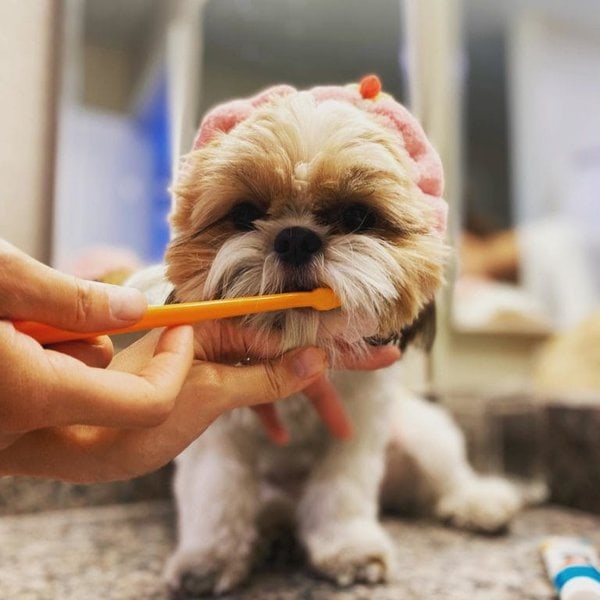
What Happens If You Don’t Get Your Dog’s Teeth Cleaned?
Failure to clean your dog’s teeth when due, places such a pooch at a higher risk of suffering from dental infections and diseases.
Poor and stinky breath is also an issue that comes with failure to regularly clean your dog’s teeth, but this is considered to be a minor problem, compared to the possibility of infections.
The dog’s anatomy is such that the root of its tooth is directly connected to the bloodstream; Hence, if your pooch develops dental infections as a result of your failure to properly clean its teeth, then there’s every possibility for the bacteria responsible for such infections to make their way into the dog’s bloodstream and wreak havoc to body organs.
Also, as a result of your dog’s poor oral hygiene, the dog’s teeth will most likely end up becoming rotten and diseased, and you will then have to spend a considerable amount of money on tooth extraction procedures.
How Do You Know If Your Dog’s Teeth Needs To Be Pulled?
Some of the signs that your pooch is due for a comprehensive teeth cleaning procedure include:
- Visible plaque build-up on the teeth
- Bad breath
- Loss of interest in play that involves grabbing objects with the mouth
- Lethargy
- Signs of wear and tear on the teeth
For tooth extraction which is typically needed in cases of teeth misalignment, baby teeth retention, periodontal diseases, and fractures, the dog will require more complex surgical procedures, rather than the regular dental cleaning. And you may also notice signs such as:
- Bleeding in the gums
- Loss of appetite
Dogs are very stoic, and may not show obvious signs of pain when they have issues with their teeth; Therefore, this is why it is very important that you pay close attention to your pooch’s mouth, and take such a dog for a comprehensive medical examination immediately if you notice any of the signs listed above.
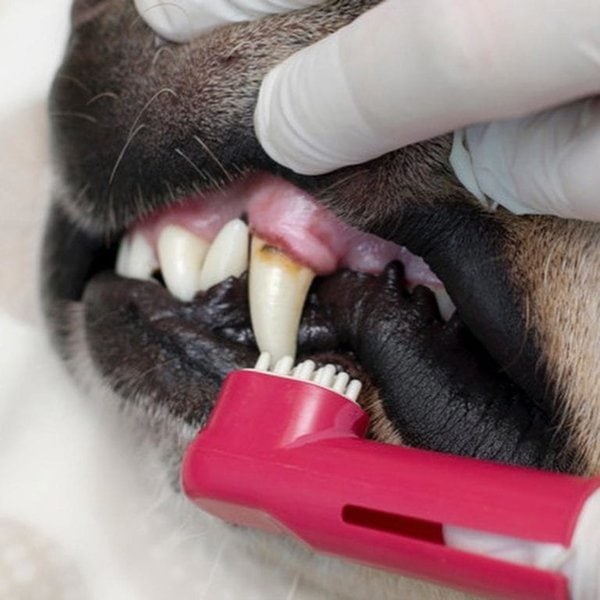
How Safe Is Dog Teeth Cleaning?
Dog teeth cleaning is a relatively safe process, provided a vet observes all the necessary procedures before sedating a dog and embarking on the teeth cleaning operation.
Some of the procedures that need to be carried out before a dog is placed on anesthetics include:
- A thorough physical examination and blood tests to check for the presence of diseases that may hamper the cleaning process, and
- The formulation of a specific pain management plan for the dog.
Additionally, a vet will monitor the dog’s vital signs during and after sedating the pooch, and at the first sign that something is going wrong, the medical team will spring into action to guarantee the dog’s safety.
However, like any other medical operation, there is a chance that complications may arise during the teeth cleaning procedure, and this can potentially put a dog in harm’s way.
The application of anesthesia in sedating a dog before a dental cleaning procedure comes with its potential risks, and it is one that continues to generate a lot of discussion in the medical world.
While it is possible for dogs to die while under anesthesia for a dental cleaning procedure, chances of this happening are extremely low. And your dog will most likely come out of the entire operation with white shiny teeth and no side effects.
To be on the safer side though, it is highly advisable to place your pooch on a canine insurance plan that covers dental accidents or deaths.
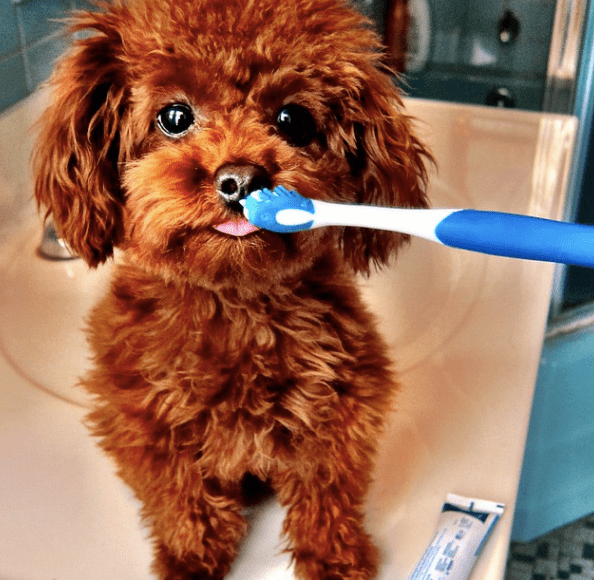
Does Dog Insurance Cover Teeth Cleaning?
Yes, there are several insurance companies that cover the cost of canine teeth cleaning procedures.
Most traditional insurance companies do not include routine dental care in their dog insurance packages. And most times, these insurance providers will only reimburse customers for surgical procedures such as tooth extraction after they have been completed, which means that the pet owners will need to cover the initial costs on their own.
Consequently, this is why it is highly important that you carry out the appropriate research and pick an insurance company that has made provisions for your dog’s dental health.
Finding an insurance plan that offers coverage for canine dental procedures can potentially save you thousands of dollars that you would otherwise need to dig out of your own pocket at the vet’s.
That said, some pet insurance companies that offer coverage for dental cleaning procedures, and which you should consider giving a try include:
The pet insurance companies listed above typically don’t cover dogs with pre-existing medical conditions; Hence, if you have a pooch with a history of dental disease, you will most likely have to continue paying for its medical expenses from your pocket.
